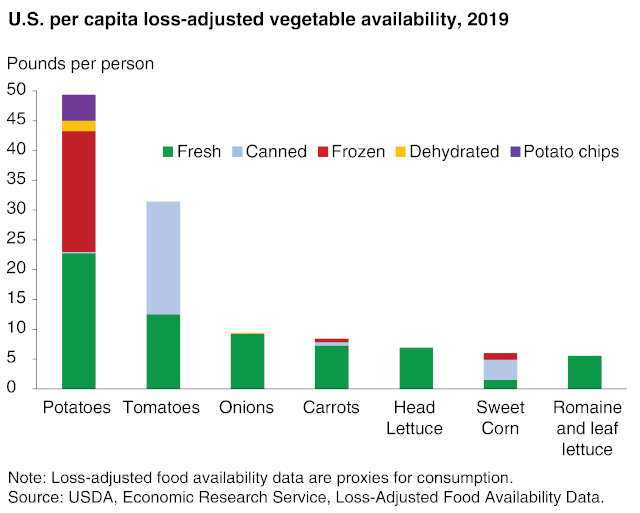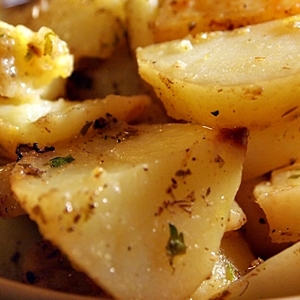The U.S. Dietary Guidelines Advisory Committee (DGAC) is starting deliberations over its Dietary Guidelines updates for 2025. And one suggestion under discussion is that potatoes should be officially reclassified as ‘grains’…

It’s a nutty notion, to say the least. As least as far as we ‘average’ folks are concerned. But the diet and nutrition pros are considering moving potatoes into the same category as grains, bread, beans and other carbs.
Reason is technical
The reason for the proposed shuffle is highly technical. The official Dietary Guidelines recommend that folks eat foods according to the nutritional groups into which they fall. The accepted groups are: dairy, fruit, grains, protein, and vegetables. No problem with that. We’re al familiar. But the experts say we’re eating too many potatoes and not enough other foods from the ‘vegetable’ category.
How much?
The U.S. Department of Agriculture’s Economic Research Service says, when Americans report they’re eating vegetables, they’re mostly eating potatoes and tomatoes. In 2019, the average American consumed 49.4 lb. /20.5 kg of potatoes over the course of 2019, the last year for which statistics uncorrupted by eating habit changes due to the COVID Crisis are available. Tomatoes came in a strong second, at 31.4 lb. / 14.3 kg per person.
A Food and Wine story published last week observed: “It’s not totally surprising that French fries and pizza sauce significantly contributed to our annual totals.”
The crux of the issue
So… When Americans report eating lots of veggies – apparently in compliance with the Dietary Guidelines – they are really not getting the nutritional value the Guidelines are intended to promote.
For example: Onions came in third, after Tomatoes. But the numbers plummeted at that point to less under 10 lb. / 4.5 kg. And other ‘most popular’ veggies followed with decreasing numbers, landing at under 5 lb. / 2 kg for Romain lettuce.
A modest proposal
Some members of the DGAC say the categories and recommendations should stay the same. But potatoes should be moved over to the ‘Starches’ slot. That way, folks will be ‘encouraged’ to eat more ‘high-nutrition’ veggies.
The Potato people disagree
“While National Potato Council (NPC) is sensitive to individual needs and cultures, we urge the Committee to recognize [that] a potato is not a grain,” he told the DGAC. “Potatoes are the most widely produced vegetable in the U.S.Starchy vegetables and grains are two vastly different food groups that play distinctly different roles in contributing nutrients to the diet. Unlike grains, white potatoes are a strong contributor of potassium, calcium, vitamin C, vitamin B6, and fiber. Research shows that diets high in vegetable consumption, including potatoes, promote healthy outcomes overall.”
So do the Grain people
But they’re a little less outspoken. The official Grain Chain submission to the DGAC warned, shifting potatoes to the grains category, “could further exacerbate nutrient shortfalls.”
But it all boils down to bucks
But the real reason the producers are against the change is that it threatens to reduce, or dilute their respective shares of the food market.
The potato people don’t want to have to compete with the grain people in a re-jigged ‘starches’ category. And the grain people don’t want people thinking they can get the nutritional value out of potatoes that grains provide.
The problem is, potatoes are relatively cheap. One of the cheapest vegetables you can put on your table. Commercially, French fries are the most profitable item on any fast food menu – after coffee and fountain drinks. Cash-strapped consumers will naturally choose spuds over grain products if the two are lumped in together.
My take
I have to agree with the NPC: “The suggestion to reclassify potatoes as a non-vegetable is not grounded in any scientific metric. This unsupported notion, if acted upon, will confuse consumers.”
But I’m not convinced that the shuffle would materially affect the two food categories as seriously as the producers’ organizations claim.
The NPC cautions, the move, “could result in nutrient gaps and also decreased vegetable consumption.” I don’t see how the vegetable consumption picture could be any more screwed up than it already is, with many of the best, most nutritious veggies already priced beyond the reach of those at the bottom of the economic ladder.
And food prices are expected to continue to rise through this year. The best, the economists tell us, we can expect, is that the rate of increase will slow -a little…
~ Maggie J.

